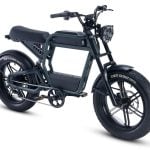Central Oregon is at the forefront of a heated debate regarding the future of electric bike (e-bike) usage on popular trails. The Deschutes National Forest officials recently unveiled a draft plan that proposes allowing class 1 e-bikes on 67 existing trails near Bend, Sisters, and Sunriver. While this move is aimed at creating equitable access and minimizing conflicts among different user groups, it has unleashed a wave of arguments from both proponents and opponents.
Class 1 e-bikes are defined as pedal-assist bikes that do not have a throttle and have a maximum speed of 20 mph. Currently, all types of e-bikes are only permitted on roads or trails designated for motorized vehicles in the Deschutes National Forest. However, if the proposed rules are implemented, popular mountain biking areas such as Peterson Ridge, Phil’s Trail, Sunriver, and Wanoga would also be open for class 1 e-bike use.
Critics argue that e-bikes are too powerful and could lead to overcrowding and environmental damage on the trails. Furthermore, concerns have been raised about enforcement and how the rules will be effectively applied. In response to the divisive nature of the topic, the private BendTrails Facebook group has even banned discussions about e-bikes.
However, there are individuals like Dacia Kailin, a 28-year-old Bend resident with a genetic cardiac condition, who view expanded e-bike access as a life-changing opportunity. Currently unable to ride her own e-bike due to limitations on where they are permitted, Kailin believes that allowing more e-bike access would enable people of all ages and ability levels to participate in outdoor activities.
Passionate mountain bikers like Don Leet, who has been riding the trails in Bend for decades, strongly oppose the rule changes. Leet argues that even class 1 e-bikes are too powerful for safe coexistence with regular mountain bikes. He likens the conflict over e-bikes to a past battle over motorized vehicle use in wilderness areas, where the preservation of non-motorized access ultimately prevailed.
With different perspectives and fears surrounding the proposed rule changes, there is a concern that rapid growth in e-bike usage could lead to issues of overuse and lack of education. Supporters, like Kevin Hopper, emphasize the importance of education and proper trail etiquette to prevent such problems.
The future of e-bike usage on central Oregon trails remains uncertain. The Deschutes National Forest is currently accepting public comments on the draft plan until July 31. The agency aims to strike a balance between expanding access and ensuring the preservation of the natural environment, while also addressing concerns about enforcement and education. The proposed e-bike rules could potentially come into effect by next April, bringing both excitement and apprehension to outdoor enthusiasts in the region.
The e-bike industry has been experiencing significant growth in recent years. According to a report by Market Research Future, the global e-bike market is projected to reach $38.6 billion by 2025, growing at a CAGR of 9.01% during the forecast period. The increasing demand for eco-friendly transportation alternatives and the rising popularity of cycling for fitness and recreation are major factors driving the market growth.
In the United States, e-bike sales have also been on the rise. According to the NPD Group, e-bike sales doubled in 2020 compared to the previous year, with a notable increase in demand during the COVID-19 pandemic. As more people looked for outdoor activities and alternative modes of transportation, e-bikes emerged as a popular choice.
The proposed rule changes in Central Oregon reflect the larger debate surrounding e-bike usage on trails across the country. While some argue that e-bikes provide opportunities for individuals with physical limitations and can help increase access to outdoor recreational activities, others express concerns about trail congestion, environmental impact, and conflicts with traditional mountain bikers.
Issues of overcrowding and environmental damage are legitimate concerns in areas where e-bike usage is allowed. Increased traffic on trails can lead to erosion, habitat disturbance, and conflicts between user groups. Proper trail management and education are crucial in mitigating these issues. Organizations like the International Mountain Bicycling Association (IMBA) have developed guidelines for responsible e-bike use to ensure sustainable trail experiences.
The enforcement of e-bike rules is another issue that needs to be addressed. With different types and classes of e-bikes, it can be challenging for trail managers and law enforcement agencies to distinguish between permitted and prohibited bikes. Clear regulations and effective enforcement mechanisms are necessary to maintain trail integrity and ensure user safety.
Education and awareness play a key role in addressing the concerns surrounding e-bike usage. Promoting trail etiquette, responsible riding practices, and environmental stewardship can help foster a culture of respect among all trail users. Organizations, local communities, and trail advocacy groups can collaborate to provide education and resources to e-bike riders, helping them understand the specific rules and expectations in different trail systems.
Public input is crucial in shaping the future of e-bike regulations. As the Deschutes National Forest accepts comments on the proposed plan, individuals, advocacy groups, and stakeholders can contribute their perspectives and concerns, helping the agency make informed decisions. The goal is to strike a balance between expanding access and protecting the natural environment, while also addressing the needs and concerns of various user groups.
It is important to note that the discussions and debates about e-bike usage on trails are not unique to Central Oregon. Many other regions and trail networks are facing similar challenges and are working on finding appropriate solutions that can accommodate different user groups and ensure sustainable trail experiences for all.
To learn more about the e-bike industry and related topics, you can visit Electric Bike Report or eBicycles.com. These websites provide comprehensive information on e-bike technology, market trends, and industry developments.
The article has been updated: 2024-11-02 03:28
Here are some suggested related links for your post title “Expanding Access to E-Bikes in Central Oregon Sparks Debate”:
1. Oregon Public Broadcasting – A public media outlet providing news, stories, and insights on various issues affecting Oregon, including transportation and environmental topics.
2. Bike Portland – A community-driven site focusing on biking issues in Portland and beyond, covering policies, events, and advocacy related to cycling.
3. Oregon Live – The online presence of The Oregonian newspaper, featuring a wide range of articles on local news, including issues related to transportation and urban development.
4. Outbound Collective – A platform dedicated to outdoor adventures and activism, offering resources and discussions on sustainable travel and recreation.
5. Portland Mercury – A news source that provides a mix of local news, cultural commentary, and advocacy focusing on Portland and the surrounding areas, including transportation debates.
6. State of Oregon – Official state government website featuring information on public policy, including transportation initiatives and sustainability programs.
7. NBC News – A major national news organization that covers significant developments across the country, including emerging trends in transportation and environmental policies.
8. CityLab – A publication that explores urban issues, focusing on transportation, policy, and innovative solutions for city living.
9. American Public Transportation Association – Advocates for public transportation initiatives, offering insights and research that may intersect with discussions on e-bikes and urban mobility.
10. PeopleForBikes – An organization focused on promoting biking and advocating for policies that support cycling infrastructure, including e-bikes.
The article has been updated: 2024-11-03 12:34
What are the main arguments for and against expanding access to e-bikes in Central Oregon?
The debate surrounding the expansion of e-bike access in Central Oregon includes various arguments on both sides.
Proponents of expanding access argue that e-bikes can enhance mobility, reduce traffic congestion, and promote eco-friendly transportation options. They see e-bikes as a means to encourage more residents to cycle, leading to healthier lifestyles and lower carbon emissions. Furthermore, advocates believe that e-bikes can improve access to outdoor recreation and tourism, benefiting local economies.
On the other hand, opponents express concerns about safety and the potential impact on traditional bike paths and trails. They worry that increased e-bike traffic may lead to accidents, especially in areas where cyclists and pedestrians share space. Additionally, some critics argue that expanding access could lead to overuse of natural areas, resulting in environmental degradation.
Ultimately, the discussion highlights the need to balance the benefits of e-bikes with the potential challenges they pose to the community and the environment.







